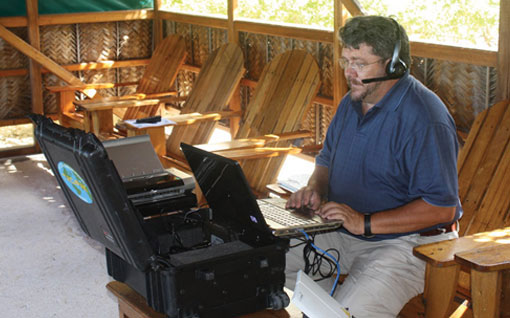by KARA PETROVIC // Fall 2010

For years, Gary Cagle (B.A. ’85) has traveled the world, aiding countries ravaged by conflict and Mother Nature. From Rwanda and Somalia to Iraq and back home to the flooded streets of New Orleans, his humanitarian efforts have helped countries and cities most devastated by natural disasters start over.
Cagle spent nearly two months in Haiti earlier this year helping the non-governmental organization Team Rubicon and the World Health Organization (WHO) with medical disaster relief response planning and management. He currently serves on the Team’s Board of Advisors, and as an international liaison, interfacing with the United Nations, WHO and other international organizations such as Doctors Without Borders.
Last December, he returned to the United States after six months in Asia aiding the Maldives — a small island nation in the Indian Ocean — as part of a United Nation’s disaster relief team. The island and surrounding countries near the southern tip of India were swallowed by walls of water stretching 22 feet high and two miles wide as the destructive 2004 tsunami swept away homes, businesses, cars and more than 157,000 people.
“Helping these countries start over is what makes my missions worthwhile,” says Cagle, who served as the U.N.’s disaster management consultant during the trip. “This work has changed my life in ways I never would have expected, and it’s shown me how much we all take for granted. “By watching the Maldivian people start over, I’ve learned that we are lucky we don’t have to worry about catching enough fish to make sure our families don’t go hungry. That trip made me even more appreciative of what we have in America.”
Prior to his humanitarian work, Cagle served as a commissioned officer in the U.S. Army’s Medical Service Corps before being medically discharged in 1997. He completed UMKC’s Army ROTC program in 1985 and was a member of the University’s first commissioned class since 1945. Cagle says his service prepared him for his current duties of disaster medicine planning and relief execution training. Cagle worked directly with the National Disaster Management Center of the Republic of the Maldives — similar to the U.S.’s FEMA — by providing relief assistance to the organization’s minister and teaching Incident Command System certification courses.
“I’ve done a tremendous amount of training,” Cagle says. “With this train-the-trainer program, my Maldivian students who pass the course will, over the course in the next year, go out and each train a new class of 20. This system is set up and designed to simplify and make disaster relief response easier for their fire fighters, police officers and the Maldivian’s military National Defense Force.
“The success of my training is what made that six-month mission worthwhile, because we greatly increased the internal capacity of the Maldivian first responders to handle another disaster if and when it happens,” Cagle says.
Cagle says he also visited 29 inhabited Maldivian islands and saw parts of the country that more than 90 percent of foreigners never see, because most tourists only see resorts or the few “tourist islands” with representative fishing villages and tourist sites. “I fell in love with the country and the people,” he says. “I went there trying to make a difference and I think I did, and while I don’t know if I’ll ever go back, I made some lifelong Maldivian friends.”
